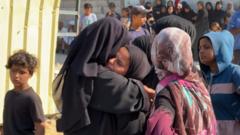Amidst significant global condemnation of the effects of its military actions in Gaza, Israel unveils measures to facilitate humanitarian aid, allowing air drops and establishing designated corridors. However, both critics and aid organizations remain doubtful about the effectiveness and sincerity of these moves, citing ongoing violence and inadequate aid distribution.
Israel's Aid Measures: A Gesture Amid Growing Global Condemnation

Israel's Aid Measures: A Gesture Amid Growing Global Condemnation
In a response to international outcry regarding humanitarian conditions in Gaza, Israel announces new aid measures, facing skepticism from various humanitarian agencies and organizations.
Israel has recently come under intense international scrutiny for the humanitarian crisis in Gaza, leading it to announce a series of measures aimed at improving the humanitarian response. The Israel Defence Forces (IDF) indicated that these measures included allowing airdrops of essential aid, with the IDF reportedly executing the first such drop during the night and enabling the United Arab Emirates airforce to conduct another later.
In addition, the IDF stated that it would implement a "tactical pause in military activity" in certain regions to facilitate the flow of aid and establish "designated humanitarian corridors." Nevertheless, Hamas has dismissed these actions as mere attempts to polish Israel's image in the face of global criticism over reports of starvation in Gaza.
Recent events have only compounded doubts over Israel's commitment to alleviating the humanitarian crisis. A subsequent airstrike occurred even during the claimed period of "tactical pause," resulting in civilian casualties, including the tragic deaths of a mother and her four children.
Despite Israel's assertions that it does not impede humanitarian aid, this view is not shared by its allies in Europe, the United Nations, and various humanitarian organizations. These critics have noted that the latest measures appear to be a reluctant acknowledgment from Israel that it must respond to the international backlash regarding the dire situation in Gaza.
Statements from leaders in Britain, France, and Germany have highlighted the urgent need for Israel to lift restrictions on aid and comply with international humanitarian obligations. Previously in effect was a strict blockade of all aid into Gaza, coupled with stringent approval processes that limited the delivery of humanitarian supplies. Israel has suggested a new distribution mechanism through the 'Gaza Humanitarian Foundation' (GHF), designed to replace the United Nations-led aid network, which Israel accuses of corruption. However, the GHF's processes have faced substantial criticism as being militarized and detrimental to the Palestinian populace.
In light of these issues, UN officials have vehemently condemned the tactics employed by the GHF. Critical voices like that of Jonathan Whittall, who oversees humanitarian operations in the Occupied Palestinian Territories, stress that the situation in Gaza is more desperate than ever. Improvements, they argue, depend on a significant reduction in delays at border crossings and assurances that civilians collecting aid will not face violence from Israeli forces.
Moreover, international legal concerns continue to cloud Israel's image; its Prime Minister and former Defense Minister face ongoing scrutiny from the International Criminal Court concerning alleged war crimes related to starvation tactics. Israel has continuously rejected these claims.
While Israel publicizes its airdrop efforts, observers highlight that such measures are often inadequate and most often emerge in dire situations where no other options exist. Critics suggest that true resolution of the humanitarian matters in Gaza requires a comprehensive ceasefire, unhindered long-term access for aid, and a commitment to end the hostilities that have resulted in widespread suffering among the Palestinian population.




















